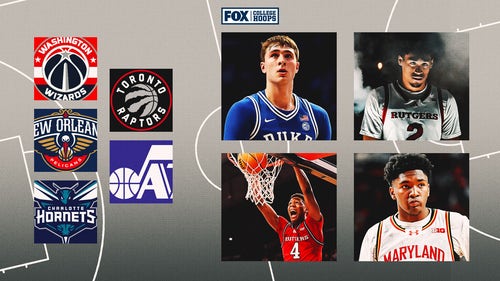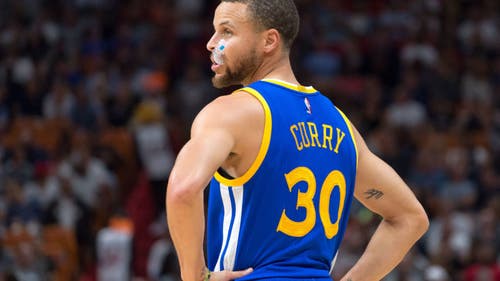
Buck says NBA needs concussion protocol
Three years ago, when he was at UCLA, Luc Richard Mbah a Moute sustained a concussion that kept him off the basketball court for eight days, until he completed a series of neurocognitive tests.
That's why the Bucks forward was so surprised when all he needed to return this season following a mild concussion was simply his word to the training staff.
''I didn't have to do any tests because we were on the road and doctors were here,'' Mbah a Moute said. ''They just asked me how I was feeling, and I told them I was feeling better. They were like, 'You're fine.'''
Mbah a Moute said he knocked heads with a Dallas defender on Jan. 1 and returned three days later, despite some soreness on his left side of his head. The experience has made him think there should be a league-wide policy to handle every concussion.
''There should be standards in the NBA. You need to do these tests and pass these tests before you can come back on the court. Bottom line. We definitely don't get as bad concussions as football and other sports, but a concussion is a concussion,'' Mbah a Moute said. ''It's a serious injury and there should be tests.''
While league officials say concussions are rare in the NBA, Milwaukee has dealt with a flurry of head injuries this season, highlighting the fact that the injuries can and do happen on the hardcourt. Mbah a Moute didn't sit out a game with his, though the Bucks listed the two other players who missed time this season as having ''concussion-like symptoms.'' Carlos Delfino was out 32 games with what he said was, indeed, a concussion and Corey Maggette sat for two more.
The Bucks said they handle every head injury on a case-by-case basis, and general manager John Hammond said the team takes the issue seriously.
''Head injuries have now become a real hot-button issue in sports in general. And, I think that when a player is dealing with issues like this, we have to be concerned and well we should be,'' Hammond said. ''I just think it's obviously something you can't take lightly, you can't take for granted.''
The NBA and the players' union say they are monitoring head hits, but there hasn't been the same level of concern as in other sports such as hockey and football, in which concussions are more common.
''We pay significant attention to this particular injury,'' NBA spokesman Tim Frank said. ''We keep track of every injury that happens in the league and spend considerable time educating doctors on the dangers of concussions and how to identify them.''
Other leagues have taken or are considering new steps to limit or better diagnose head injuries.
NHL Commissioner Gary Bettman said during All-Star game weekend that concussions are up this season, though he noted the increase seems to be caused by accidental or inadvertent situations, instead of contact from another player. The NHL added ''Rule 48'' late last season that bans lateral blindside hits to the head.
Yet Sidney Crosby missed the All-Star game with a concussion and the Boston Bruins put Marc Savard on long-term injured reserve Monday with his second concussion in less than a year.
Major League Baseball has been considering a seven-day disabled list specifically for concussions and redesigned batting helmets have been introduced that can withstand greater impact from thrown baseballs.
The NFL made much of its crackdown on players for helmet-to-helmet hits, and decided before the season to make every team identify an independent neurologist for players to see when they have a concussion - like the NHL does.
According to league data obtained by The Associated Press in December, the number of concussions being reported this past season was up more than 30 percent from 2008. The league considered that proof teams and players were taking head injuries more seriously and being more open about them.
Delfino, who returned to play Jan. 21, was out 2 1/2 months with symptoms that included headaches, nausea and fatigue following what he believes was his second concussion in less than a year.
The Argentine said he thinks he sustained an initial concussion last March 26 when he stumbled and landed face down in the lane driving for a layup. Miami's Udonis Haslem jumped for the loose ball and inadvertently landed on the back of Delfino's head and neck. Delfino said he was knocked unconscious.
He missed three games the next week, but returned. The team described Delfino's absence at the time as being due to neck and jaw soreness.
In November, he said he was hit in the head against Minnesota on Oct. 29, followed by additional blows to the head against Charlotte the next night and Indiana on Nov. 5. When the Bucks played New Orleans on Nov. 6, Delfino only lasted 17 minutes.
''Everything was moving so fast and so different. It was kind of a feeling of being on a boat. Everything was moving, everything was fast and the basketball was deep, far away from me. It just wasn't right,'' Delfino said. ''I didn't take care of the injury like I should have, because the last time I passed out.''
However, Delfino doesn't believe the injury involving Haslem was related to his problems this year.
Still, he spent a long time with specialists and team trainers, talking about how best to protect against another blow to the head. He even looked into wearing a soft-sided helmet like some soccer players have used.
''You're thinking, 'What is going on in my head? What is going on with me? Am I going to be back, am I going to be the same?' You have all these questions,'' Delfino said. ''You just go and try to sit on the couch or sit on the bed and just try to stay quiet. Then you start to think, and when you start to think, you're using your brain again and you've got headaches again.''
Delfino said after passing neurocognitive tests he spent several additional weeks rehabilitating.
Mbah a Moute believes it shouldn't be left to individual teams to determine what needs to be done in the wake of a concussion. He said all players should pass tests that include neurocognitive exams and reaching physical exertion benchmarks before returning.
''I think it's only right. It doesn't cost anything. It's something that people should want to do if you have a concussion,'' he said. ''I would want to do those tests to make sure I'm OK, to make sure I'm ready to be back on the court and not expose myself again.''
---
AP Sports Writer Rachel Cohen in New York contributed to this story.










